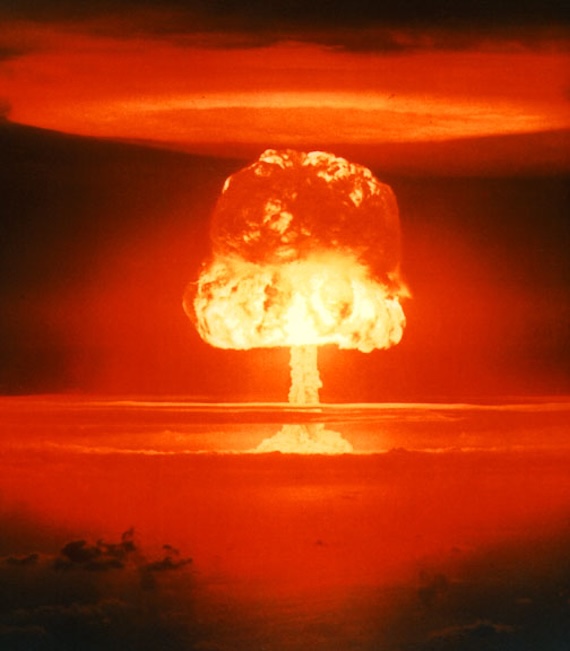This week marks 80 years since the United States used its nuclear weapons against the civilian population of Japan in August 1945.
Prior to that, the U.S. began the mass firebombing of Japanese citizens. On the night of March 9, U.S. bombers, “dropped 1,665 tons of incendiary bombs on Tokyo, unleashing a firestorm that incinerated a quarter of the city and killed 85,000 people. Over the next four months, the raids continued and, “razed almost every major Japanese city.”
In the three weeks prior to dropping its atomic bombs, 26 cities were attacked by the U.S. Army Air Force. Of these, eight—or almost a third—were as completely or more completely destroyed than the city of Hiroshima (in terms of the percentage of the city destroyed). Ultimately, over one million civilians were murdered as a result of U.S. bombing. But that was just the beginning.
On August 6, 1945, U.S. President Harry Truman ordered the United States Air Force to drop an atomic bomb on Hiroshima, and more than 78,000 people were incinerated in the initial explosion. Over time, approximately “150,000 later died from radiation exposure. Three days after that, another B-29 dropped an atomic bomb on Nagasaki…at least 23,800 people died” from the blast alone.
Ultimately, the U.S. bombing campaign “killed 330,000 people, obliterated 67 cities, destroyed 2.5 million homes…” (Alfred W. McCoy. To Govern the Globe: World Order and Catastrophic Change).
Most of the U.S. military leadership agreed that there was no military excuse for this war crime. Admiral William Leahy, who presided over the combined US-UK chiefs of staff, said that: “The use of this barbarous weapon at Hiroshima and Nagasakiwas of no material assistance in our war against Japan. The Japanese were already defeated and ready to surrender.” And the general who had won the war in Europe months earlier, Dwight Eisenhower, recalled his reaction to being told by the secretary of war, Henry Stimson, that the atomic bomb would be used. “I voiced to him my grave misgivings…on the basis of my belief that Japan was already defeated and that dropping the bomb was completely unnecessary.
Indeed, the Japanese government was already willing to surrender, for several reasons. In addition to the bombing of their cities, there was also the defeat of its army and navy in the Pacific War.
Just as importantly, Japan feared attacks by the Soviet Union, a U.S. ally in the Second World War. On August 8, Russia invaded Japanese-held Manchuria as promised.
Historian Ward Wilson explained that, “It didn’t take a military genius to see that, while it might be possible to fight a decisive battle against one great power invading from one direction, it would not be possible to fight off two great powers attacking from two different directions. The Soviet invasion invalidated the military’s decisive battle strategy, just as it invalidated the diplomatic strategy. At a single stroke, all of Japan’s options evaporated. The Soviet invasion was strategically decisive—it foreclosed both of Japan’s options—while the bombing of Hiroshima (which foreclosed neither) was not.”
“Soviet forces, on the other hand, could be in Japan proper in as little as 10 days. The Soviet invasion made a decision on ending the war extremely time sensitive.”
( “The Bomb Didn’t Beat Japan. Stalin Did”. Foreign Policy. 30 May 2013.)
Japan would have surrendered in August, even if atomic bombs had not been used — and Truman and his closest advisors knew it.
Generals Dwight Eisenhower, Douglas MacArthur, Henry Arnold, and Admirals William Leahy, Chester Nimitz, Ernest King, and William Halsey are on record stating that the atomic bombs were either militarily unnecessary, morally reprehensible, or both.
Leahy, who was Truman’s chief of staff, wrote in his memoir that, “the use of this barbarousweapon at Hiroshima and Nagasaki was of no material assistance in our war against Japan. The Japanese were already defeated and ready to surrender …. In being the first to use it we had adopted an ethical standard common to the barbarians of the Dark Ages.” Gar Alperovitz & Martin Sherwin. 6 Aug. 2020. “Dropping Atomic Bombs on Hiroshima and Nagasaki Was Unnecessary”. Los Angeles Times.

File: “Operation Castle,” 1954. National Nuclear Security Administration. Public Domain. Via Picryl
The real reasons that President Harry Truman ordered this barbarous attack was to:
1) show the world who was boss;
2) to intimidate Russia;
3) to test the effect of nuclear weapons on human beings.
That’s why the atomic bombings were war crimes, according to the Rome Statute of the International Criminal Court:
- Article 8
War Crimes
2b.
i. Intentionally directing attacks against the civilian population as such or against individual civilians not taking direct part in hostilities.
v. Attacking or bombarding, by whatever means, towns, villages, dwellings or buildings which are undefended and which are not military objectives.
(Note: these statutes also apply in war zones like Gaza and Ukraine).
More than ever, the people of the world need today’s nuclear powers (the United States, Russia, the United Kingdom, France, China, Israel, India, Pakistan, and North Korea) to do everything possible to eliminate the potential use of nuclear weapons.


 © 2026 All Rights Reserved
© 2026 All Rights Reserved